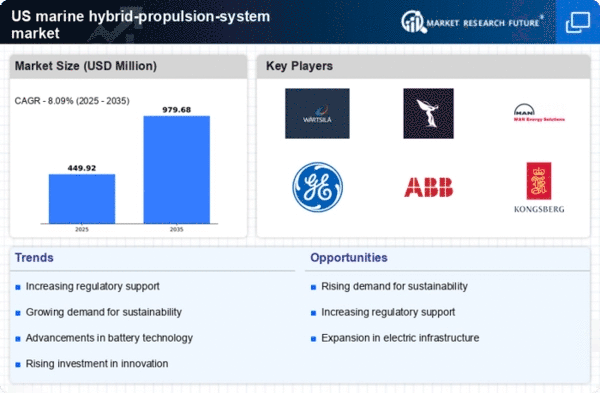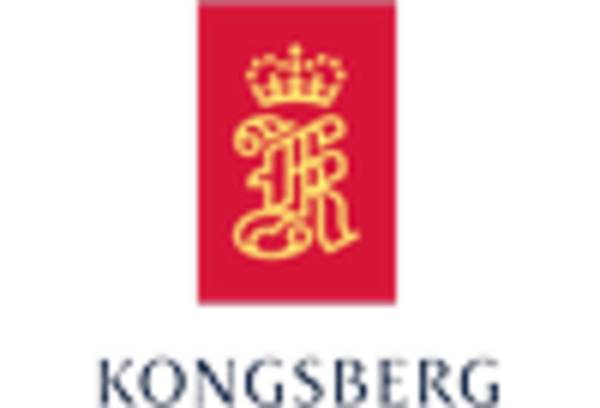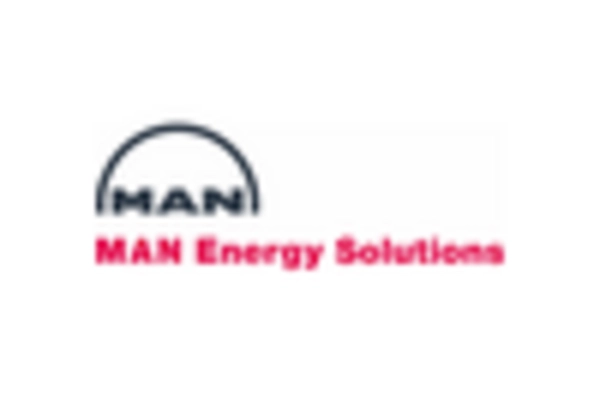Rising Fuel Costs
Rising fuel costs are significantly impacting the marine hybrid-propulsion-system market. As traditional fuel prices fluctuate, operators are increasingly seeking alternative propulsion systems that offer better fuel efficiency and lower operational costs. Hybrid systems, which combine conventional engines with electric propulsion, can reduce fuel consumption by up to 30%, making them an attractive option for vessel operators. This trend is particularly relevant in the US, where the maritime industry is under pressure to optimize costs while maintaining performance. The potential for long-term savings on fuel expenses is driving investment in hybrid technologies, thereby propelling the growth of the marine hybrid-propulsion-system market.
Government Incentives and Funding
Government incentives and funding play a crucial role in the marine hybrid-propulsion-system market. Various federal and state programs are designed to promote the adoption of cleaner technologies in the maritime sector. These initiatives often include grants, tax credits, and subsidies aimed at reducing the financial burden on operators transitioning to hybrid systems. In the US, the Department of Transportation has allocated substantial funding to support research and development in sustainable marine technologies. Such financial backing not only encourages investment in hybrid propulsion systems but also accelerates the pace of innovation within the industry, thereby enhancing the overall growth prospects of the marine hybrid-propulsion-system market.
Growing Demand for Efficient Logistics
The growing demand for efficient logistics is a significant driver of the marine hybrid-propulsion-system market. As global trade continues to expand, the need for reliable and cost-effective transportation solutions becomes increasingly critical. Hybrid propulsion systems offer enhanced operational efficiency, allowing vessels to operate more effectively in various conditions. In the US, the logistics sector is under pressure to reduce costs while improving service delivery. The adoption of hybrid systems can lead to lower fuel consumption and maintenance costs, making them an appealing choice for shipping companies. This trend is likely to contribute to the sustained growth of the marine hybrid-propulsion-system market in the coming years.
Environmental Sustainability Initiatives
The marine hybrid-propulsion-system market is experiencing a surge in demand driven by increasing environmental sustainability initiatives. Regulatory bodies and environmental organizations are advocating for reduced emissions and lower carbon footprints in marine operations. This push aligns with the broader trend of adopting cleaner technologies across various industries. In the US, the Environmental Protection Agency (EPA) has set stringent guidelines for emissions from marine vessels, which has prompted shipbuilders and operators to invest in hybrid propulsion systems. The market is projected to grow as companies seek to comply with these regulations while enhancing their operational efficiency. As a result, the marine hybrid-propulsion-system market is likely to see a compound annual growth rate (CAGR) of approximately 10% over the next five years.
Technological Integration and Innovation
Technological integration and innovation are pivotal drivers of the marine hybrid-propulsion-system market. Advances in battery technology, energy management systems, and propulsion design are enhancing the efficiency and reliability of hybrid systems. The integration of smart technologies, such as IoT and AI, allows for real-time monitoring and optimization of propulsion systems, leading to improved performance and reduced emissions. In the US, research institutions and private companies are collaborating to develop cutting-edge solutions that cater to the specific needs of the marine industry. This focus on innovation is expected to foster a competitive landscape, further stimulating growth in the marine hybrid-propulsion-system market.
















